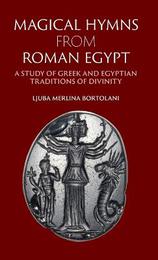
|
Magical Hymns from Roman Egypt: A Study of Greek and Egyptian Traditions of Divinity
Hardback
Main Details
| Title |
Magical Hymns from Roman Egypt: A Study of Greek and Egyptian Traditions of Divinity
|
| Authors and Contributors |
By (author) Ljuba Merlina Bortolani
|
| Physical Properties |
| Format:Hardback | | Pages:488 | | Dimensions(mm): Height 223,Width 145 |
|
| Category/Genre | History of religion
Ancient Egyptian religion and mythology |
|---|
| ISBN/Barcode |
9781107108387
|
| Classifications | Dewey:299.31 |
|---|
| Audience | | Professional & Vocational | |
|---|
|
Publishing Details |
| Publisher |
Cambridge University Press
|
| Imprint |
Cambridge University Press
|
| Publication Date |
10 October 2016 |
| Publication Country |
United Kingdom
|
Description
This interdisciplinary study investigates the divine personas in the so-called magical hymns of the Greek magical papyri which, in a corpus usually seen as a significant expression of religious syncretism with strong Egyptian influence, were long considered to be the 'most authentically Greek' contribution. Fifteen hymns receive a line-by-line commentary focusing on religious concepts, ritual practice, language and style. The overarching aim is to categorise the nature of divinity according to its Greek or Egyptian elements, examining earlier Greek and Egyptian sources and religious-magical traditions in order to find textual or conceptual parallels. Are the gods of the magical hymns Greek or Egyptian in nature? Did the magical hymns originate in a Greek or Egyptian cultural background? The book tries to answer these questions and to shed light on the religious plurality and/or fusion of the two cultures in the treatment of divinity in the Greek magical papyri.
Author Biography
Ljuba Merlina Bortolani has studied classics, Egyptology and papyrology and is a Postdoctoral Researcher in the Cluster of Excellence 'Asia and Europe in a Global Context' at the University of Heidelberg, working on the project 'Cultural plurality and the fusion of traditions between East and West: the magic of transculturality'.
|